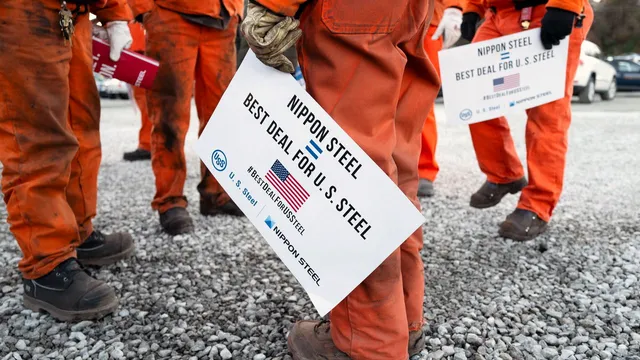
U.S. Steel Faces Stark Choices as Nippon Steel Merger Founders
2025-01-12 03:42- President Biden's executive order blocked the acquisition of U.S. Steel by Nippon Steel citing national security.
- The CFIUS granted an extension for the companies to review their legal challenge against the order.
- Both companies are seeking to complete the deal to secure the future of the U.S. steel industry amidst financial uncertainties.
Express your sentiment!
Insights
In January 2025, the Biden administration announced a delay in enforcing a requirement from an executive order mandating Nippon Steel to abandon its $14.9 billion acquisition bid for U.S. Steel. This decision came after President Biden had blocked the merger on national security grounds, a move that many see as significant in the context of foreign investment in U.S. industries, especially in the steel sector. The companies involved expressed their relief at the extension granted by the Committee on Foreign Investment in the United States (CFIUS), which now has until June 18, 2025, to further assess the situation. This extension provides a window for the companies to challenge Biden's decision in court, alleging that their case has not been reviewed fairly due to political bias. The bid's rejection not only reflects the administration's cautious stance toward foreign acquisitions, particularly from countries like Japan but also highlights the ongoing struggle for U.S. Steel. Once a thriving giant, the company is now faced with numerous obstacles as it seeks to modernize and compete in an evolving market landscape. The absence of a merger partner could lead U.S. Steel to consider plant closures and layoffs, presenting a dire picture for its workforce and the communities reliant on it for jobs. Should the acquisition remain blocked, the company will have to navigate a challenging path that may include seeking other partnerships that could also trigger antitrust scrutiny. The context of this legal battle also illustrates the intersection of business and politics in the U.S. As both Biden and his predecessor had shown opposition to the merger, U.S. Steel and Nippon Steel argue that the political climate has tainted the federal review process. Their lawsuit reflects a growing tension between industry needs and national security assertions. The companies continue to assert that the merger is vital for securing a stable future for the American steel industry, emphasizing that successful consolidation could lead to enhanced competitiveness globally. As events unfold, the implications of the ongoing legal challenge will reverberate not only through the steel industry but may also set a precedent for future foreign investments in sensitive U.S. sectors. Both firms maintain their determination to pursue the deal, indicating their confidence that it remains the best strategy for their survival and growth amid increasing pressures from both global and domestic markets. The coming months will determine whether they can successfully overturn the presidential order and allow for a new chapter in their corporate narratives.
Contexts
The impact of President Biden's decision on the U.S. steel industry is multifaceted, encompassing economic, environmental, and social dimensions. His administration has implemented policies aimed at revitalizing domestic manufacturing, particularly focusing on the steel sector, which has faced significant challenges due to international competition, labor issues, and environmental regulations. The decision to impose tariffs on imported steel and aluminum, initiated under the previous administration and continued by Biden, is designed to protect U.S. manufacturers from lower-priced foreign products, thus providing a boost to domestic production. This move is part of a broader strategy to ensure national security and economic resilience, emphasizing the importance of a robust steel industry in infrastructure development and defense capabilities. Moreover, the Biden administration has placed great emphasis on transitioning to clean energy and reducing carbon emissions. The steel industry is one of the largest industrial sources of greenhouse gases in the United States. In response, policies that encourage the adoption of greener production technologies, such as electric arc furnaces and innovative steelmaking processes that utilize scrap metal, are being promoted. These initiatives aim to not only reduce the industry's carbon footprint but also align it with the administration's ambitious climate goals. By investing in research and development, and offering incentives for companies that prioritize sustainability, the administration seeks to modernize the steel industry while addressing environmental concerns. The social aspect of Biden's decision is reflected in the potential for job creation within the steel industry and related sectors. As domestic steel production increases, so do opportunities for employment in manufacturing and construction. The administration's infrastructure plan, which allocates significant funding for rebuilding the nation’s roads, bridges, and other vital structures, hinges on using domestically produced steel. This investment in infrastructure is expected to generate jobs not only in the steel industry but also in the broader economy, creating a ripple effect that benefits various sectors. However, challenges remain. The U.S. steel industry must navigate the complexities of rising raw material costs, global supply chain disruptions, and ongoing trade tensions. Critics argue that tariffs could lead to higher prices for consumers and industries reliant on steel, such as automotive and construction. Nonetheless, the Biden administration maintains that the long-term benefits of a strengthened domestic industry will outweigh immediate price increases. As the steel industry adapts to the shifting landscape brought about by Biden's policies, its future will depend on balancing economic growth, environmental responsibility, and social equity.